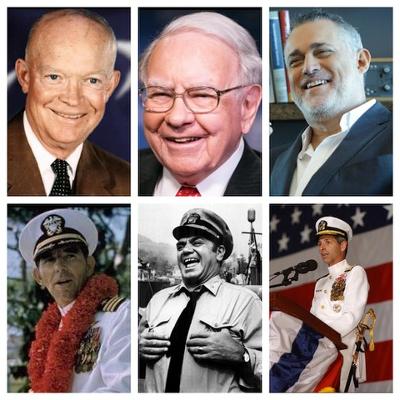
07 Sep THREE WAYS HUMOR IMPROVES LEADERSHIP AND TEAM PERFORMANCE
“A Sense of Humor is part of the Art Of Leadership, of getting along with people, of getting things done.” – Dwight D. Eisenhower.
A leader’s use of humor is a serious matter. One of America’s greatest leaders in peace, crisis and combat, President Eisenhower, strongly believed this and spoke to with deep credibility. American business executives believe it too. According to a 2017 Robert Half survey, 79% of polled C-Suite officers believe a sense of humor is important for fitting in with corporate culture and career advancement.
I’ve always admired a good sense of humor in leaders; from a fictitious TV character played by Ernest Borgnine in “McHale’s Navy,” to a real world corporate CEOs. Come to think of it, the greatest leaders I served with during 30 years as a Naval Officer all knew how to make our unit laugh at the right times, using humor as both a sword and shield. These leaders weren’t comics. They were serious warfighters, strategists and resource managers who used well timed humor to diffuse tension, influence behavior and improve organizational performance in three specific ways: 1) to enhance TEAMWORK, 2) to uplift workplace TONE, and 3) to reinforce individual and group TENACITY.
- TEAMWORK: Great leaders are great communicators. Studies indicate leaders who communicate in an entertaining fashion by using tools such as injecting humor into a dry subject achieve greater comprehension from their team. Humor also helps breaks down perceived barriers between authority figures and subordinates. For example, when Jeffrey Hayzlett, Chairman and CEO of the C-Suite Network, declares, “You think that’s bad? Lemme tell a funny story of my first time trying that!” Those type moments followed by an anecdote where leaders pokes fun of themselves goes a long way toward breaking down internal barriers and building bonds through shared experiences. Or, to help break the tension during a particularly arduous few months at sea during Operation ENDURING FREEDOM in the Northern Arabian Sea, our Aircraft Carrier Strike Group Commander, Rear Admiral Jim Zortman, invited the staff into his cabin for a couple of hours to emotionally recharge and share belly laughs watching a DVD of “The Simpsons” and driving us identify with a favorite show character (mine was “Krusty The Clown”). Plus I’ve found, whether on a battlefield or in a boardroom, a team that laughs together reflects deeper levels of inclusivity and creativity.
- TONE: Teammates don’t always remember what leaders say … they do remember how leaders make them feel. We especially remember leaders who make us smile. Smiles and laughter are contagious. Workplaces with a light mood and “fun” organizational culture have fewer potential impediments to establishing interpersonal relationships that are often found in rank-conscious hierarchal organizations. A leader’s words and deeds also set an organization’s tone. That’s especially so when it comes to humor. Berkshire Hathaway CEO, Warren Buffett, once declared after someone questioned his ordinary and sometimes rumpled business appearance, “Hey, I buy expensive suits … they just look cheap on me!” That type of self-deprecating humor demonstrates to an organization that it is led by someone who is approachable, doesn’t take himself seriously all the time and supports a fun work environment.
- TENACITY: Workplace humor can build individual and group resiliency by relieving tension during crises which allows team members to relax in times of stress. According to former Navy CAPT Gerald Coffee, who knows something about humor easing the impact of stress after spending seven years as a POW in Vietnam: “Laughter sets our spirit free to move through even the most tragic circumstances … Humor was integral to our peace of mind and our ability to go beyond survival.” For example, one POW scratched, “Smile, You’re on Candid Camera” into a shower cell block wall to provide others with a humorous coping mechanism to help break through anxiety and depression when times were at their worst. According to medical research, humor also provides a physiological boost to improve one’s toughness. Specific health benefits derived from laughing includes a boosted immune system and lower stress levels (through the release of endorphins which promote an overall sense of well being, and oyxtocins which counter the effect of the stress hormone cortisol). Here’s a bottom line for leaders who apply a sense of humor at work: fewer teammate sick days and lower stress-related job turnovers which will improve any organization’s bottom lines of Performance, Production and Profit.
Compared to a leaders’ other critical strengths such as integrity, courage, empathy and self-awareness, humor may not top the list as THE trait which positively influences others the most. However, when used in the right circumstances, particularly during times of stress and uncertainty like the current COVID-19 pandemic, it becomes a powerful performance multiplier. Figuring out the circumstance to best employ humor (i.e. to uplift and not insult) and what type of humor (i.e. laughing with members of the team vs. laughing at members of the team) is part of what Eisenhower described “art of leadership.” It’s no coincidence the greatest leaders I worked with displayed both the greatest sense of humility AND greatest sense of humor. As long as we continue to see humble leaders I’m confident we’ll continue to see them wield appropriate workplace humor – even in today’s many hyper-sensitive, politically-correct workplaces. It’s a paradox that great leaders can be serious about humor, and I’d encourage all leaders with a genuine funny bone to be genuine, exercise that skill and improve their art whenever possible.
– Rear Admiral Paul Becker, USN (Ret) led large, diverse, high-performing teams afloat and ashore as an Intelligence Officer. In 2016, The Naval Intelligence Community established “The Rear Admiral Becker ‘Teamwork, Tone, Tenacity Award for Leadership’ in his honor. He is now CEO of The Becker T3 Group, a platform for motivational keynote speaking, leadership development and security risk management.

Sorry, the comment form is closed at this time.